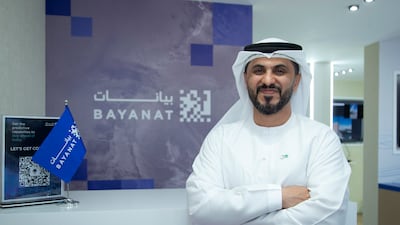Abu Dhabi's Bayanat, a geospatial data products and services provider, aims to use artificial intelligence to support the emirate's urban planning agenda, its managing director has said.
The company, which is majority owned by AI and cloud group G42, has a goal of transforming data products into information and providing recurring data-as-a-service products to its clients in the fields of national infrastructure, oil and gas, municipal infrastructure and beyond, Hasan Al Hosani told The National at the Dubai Airshow.
“AI’s impact on the geospatial industry, like all industries, has been and continues to be profound. AI significantly impacts businesses and organisations, from the way we extract insights from geospatial data, to improving data analysis accuracy and enabling real-time analysis,” he said.
“AI creates the pathway for more accurate and timely decision-making in a wide range of fields, from agriculture and urban planning to disaster management and environmental conservation. As AI continues to evolve, its impact on the geospatial industry is likely to become even more significant.”
Bayanat is prepared to collect geospatial data “with unprecedented accuracy and detail” with the expected launch of new satellites and the continuing improvements in its sensor capabilities. This will support Abu Dhabi's autonomous vehicle and smart city programmes, he said.
In May, the company teamed up with Abu Dhabi’s Al Yah Satellite Communications, better known as Yahsat and Iceye, a synthetic radar satellites developer, to build national satellite remote sensing and earth observation capabilities within the UAE.
The first satellite as part of the programme is set to be launched in the first quarter of 2024, Bayanat chief operating officer Abdulla Al Shamsi told The National at the time.
“We expect continued growth in location-based services, particularly in navigation and logistics,” Mr Al Hosani said.
Bayanat is also ensuring the responsible and ethical use of AI in its operations, “to foster trust within the market and uncover the transformative potential that AI holds for all industries”, he said.
“AI is set to revolutionise the way businesses operate, making them more efficient, customer-centric and sustainable.
“Bayanat is developing solutions that optimise route planning, resource allocation, and asset tracking, which can be used for advancements in autonomous vehicles and growing smart cities.”
Bayanat was created following the commercialisation of the UAE's Military Survey Department, a sector of the Armed Forces. It provides national-level mapping and geospatial products and services for the public and private sectors in the UAE. G42 acquired the company in 2020.
The Abu Dhabi government is currently working on the Plan Abu Dhabi 2030 initiative, designed to help the emirate respond to current and future development needs.
Last month, Abu Dhabi also launched the Smart and Autonomous Vehicles Industry cluster at clean energy hub Masdar City, aimed at establishing the emirate as a major centre for the development of high-tech vehicles, to further diversify the economy and create thousands of jobs.
The multi-modal hub is expected to contribute between Dh90 billion and Dh120 billion ($24.5 billion to $32.7 billion) to the UAE's economy and generate up to 50,000 jobs.
Abu Dhabi retained its title as the smartest city in the Middle East and North Africa, and 13th globally, thanks to its digital-first initiatives, according to Switzerland's International Institute for Management Development's Smart City Index for 2023.
The global geospatial analytics market is projected to hit $207 billion by 2030, from an estimated $79 billion in 2023, data from Fortune Business Insights shows.
“Overall, the industry's future is bright, offering not only improved convenience but also substantial environmental benefits for our communities and the world at large,” Mr Al Hosani said.
Bayanat is also continuing to strengthen its several partnerships and collaborations with government agencies, research institutions and private enterprises, both locally and globally, aimed at helping make Abu Dhabi “smarter”, he said.
“As advanced data technology becomes more accessible to both companies and the public, we predict a rise in collaboration among organisations and individuals, allowing for tech adoption and broader co-operation on a global scale.”
















